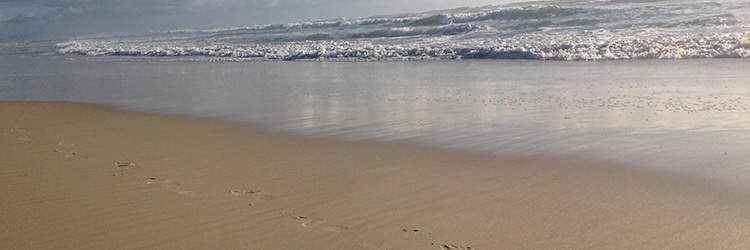By Jodi Gaines
Draw a line in the sand on a crowded public beach, and wait. Soon enough, that line will be crossed — by a person, a bird, a wave or even a random gust of wind. Think of a boundary as just that — an artificially drawn line that, because it is elusive and ever-shifting, invites both intentional and unintentional violation.
I realize that modern psychological theory has long encouraged the setting of boundaries as a way to carve out safety and space for oneself in relation to the actions of others.
However, on a deeper level, a boundary is no more and no less than a dare. And, as a risk-taking species, we are genetically set up to, well, take the dare. Over eons, we’ve had to eat, to procreate, to compete for limited resources in order to survive. It may well be part of our lower nature, but it’s there as a matter of biology.
Thus, in addition to being an artificial construct that is rarely two-sided, a boundary is a formulaic failure because the psyche often does not differentiate between biological and psychological urges.
Telling someone not to cross an emotional line as not to hurt us can be as futile, then, as telling someone who is starving that they cannot eat.
Furthermore, when I establish a “boundary” I am placing the responsibility for my own well-being in YOUR hands. If you cross that line, I feel justified in my resentment of you because you choose to disregard my well-being.
Instead, perhaps I can ask myself: What tools can I use to prevent a breach of my own happiness so that I need not rely upon a “boundary” which, because it is not organic, is doomed to fail?
Autonomy is in my toolbox. I do not need to create an artificial line in order to delineate a safe emotional territory for myself.
I am the architect of my own space without the need to consider the nature or extent of another person’s participation in that space.
Perception is another tool. You may not share my definition of safety, of respect or of whatever else I need. Boundaries are generally the product of ideals and fears that are often hidden not only from others but also in many cases from ourselves. When I accurately perceive my own needs and recognize that they may well not be within your field of vision, I claim responsibility for clear and present communication of them.
I may also call upon courage. Fear immobilizes; courage is freeing. When I access courage, I can move forward in the face of even my deepest fears.
When I set a boundary, I build a wall. I limit my mobility as well as yours; I give way to fear. When I honestly face my fears and my needs and reach for the courage to communicate them, I claim responsibility for protecting my space, meeting my own needs and vanquishing the crippling effects of fear.
Today, imagine a world without boundaries. Claim your space, acknowledge and communicate your needs, and know that you have the courage necessary to move forward and to create the authentic space you need to allow others to truly love you without limits.

